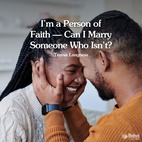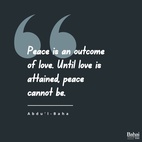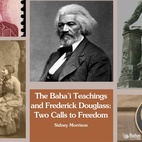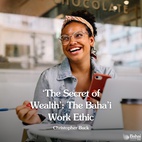The views expressed in our content reflect individual perspectives and do not represent the authoritative views of the Baha'i Faith.
The wedding march can foreshadow a difficult drill through life or a pleasant, sweet stroll underscored by the Biblical pronouncement: “And now abide faith, hope love, but the greatest of these is love.”
Unfortunately, though, some couples put more thought into the wedding ritual itself than into these abiding spiritual aspects of the marriage to come. For instance, they may not consider the potential impact of divergent beliefs on their love — and on their future.
Someone asked me the other day for advice about marrying outside their faith — specifically, about a person of deep faith marrying an agnostic or atheist.
This common dilemma may invite dramatic visions of the Montagues’ and the Capulets’ despair in Romeo and Juliet or, conversely, it may seem an inconsequential matter to swooning couples who feel aligned with only a vague definition of spirituality — no strings or institutions attached.
Historically, though, faith tends to matter in marriage. As of 1960, 81 percent of people married someone of the same religion. As of a decade ago, that percentage had declined — but still stood at 61 percent.
So, whatever role religion plays in our relationships, examining the implications of the issue before marriage just makes good sense.
Some devotees of the same faith have married only to discover a deep incompatibility despite common beliefs. Others have married outside their faith without thinking too far beyond the honeymoon. Given the high stakes, I’ve compiled several criteria that have the potential to affect your journey as a couple, whether your spiritual histories converge or not.
RELATED: Getting Married? How to Unite Body and Soul
Successful Interfaith Marriage
First, when a marriage of people with two diverse belief systems leads to lasting happiness, it tends to favor mutual respect.
In an ideal marriage, each spouse honors and upholds the dignity of the other’s belief system. This goes beyond teeth-gritting tolerance. It means each partner can identify the ways in which unique perspectives and nuanced values contribute to the desirable qualities they see in their beloved. For example, devotion to a good cause may warm your heart, even if it’s not a common cause.
In a healthy marriage, each partner not only honors the right of the other to respond to the dictates of an independent conscience, but actually respects the belief system that inspired that conscience. If, on the other hand, inward antagonism exists, it can quickly fester and erode the integrity of the marriage. Rate your relationship on mutual respect, and try to see, as the Baha’i teachings do, that all religions are essentially one, as Abdu’l-Baha said in this speech he gave in London in 1911:
All the teaching of the Prophets is one; one faith; one Divine light shining throughout the world. Now, under the banner of the oneness of humanity all people of all creeds should turn away from prejudice and become friends and believers in all the Prophets. … Then all disputes would disappear, all then would be united.
Ideology in Action
It’s wonderful to find that the person of your dreams actually does dream of the same goals for humanity that you do — but do you also prioritize lifestyle choices based on that common ideology? Or is there a “wince factor” in your interactions? Is your tongue sore from biting it? Do one or both partners feel the frequent need to get away to “be themselves,” to escape conflicting interpretations of a spiritual practice acted out in daily life?
Do you each insist on your own way of doing things, or do you embrace a definition of character that makes it easy to share friends, activities, and comfortable hours of intellectual and spiritual companionship? The happiest, best, and most permanent marriages seek a lasting love by paying attention to your ideologies in action. As Abdu’l-Baha said, “The perfect love needs an unselfish instrument, absolutely freed from fetters of every kind.”
Family Unity
When Baha’is plan to marry, they seek the consent of all living parents, who ideally then strive to offer encouragement and moral support for the union. When you marry your beloved, remember — you’re also marrying that person’s family in some ways. Ask yourselves these questions:
Does it come easily for you and your partner to include your parents as partners? Do you show respect, love, and trust for both families? How does each partner respond to the beliefs, traditions, class, and cultural identity of the betrothed’s parents?
In some cases, each partner may have left their ancestral religion, and interfaith relationships will forever be a part of the new family dynamic. To ensure a happy marriage, examine your joint efforts to fortify these relationships and your eagerness to honor the sacrifices and venerate the life experience of parents, regardless of religious distinction. This passage from the Baha’i teachings can serve as a guide:
According to the teachings of Baha’u’llah the family, being a human unit, must be educated according to the rules of sanctity. All the virtues must be taught the family. The integrity of the family bond must be constantly considered, and the rights of the individual members must not be transgressed.
Mutual Wisdom
Can you look ahead and envision your life together in five, ten, or fifty years? Is each partner willing to not only exchange family and cultural traditions, but to discuss and agree on which universal values you hold dear enough to teach the next generation?
If you have children, how will you prepare them to independently search for truth? Can you agree to work together to help them explore their spiritual roots and yet decide on their own path, or will you subconsciously instill distrust of the upbringing, beliefs, ideas, or ideals of your spouse?
Compromise sounds easy, but are you expecting your partner to compromise principles and spiritual identity — or lack of them — in ways you are not willing to do? Are you secretly hoping to change or “break down” the opinions or objections of your partner? Do you expect your children to take sides — specifically, your side? These strategies aren’t compromises, and they can all negatively impact a relationship.
If neither partner has strong spiritual ideals, maybe you won’t experience these pitfalls — but be honest with yourself and attempt to see the end from the beginning. Try to evaluate your relationship from the perspective of its potential impact on the lives of the family members in your future. Remember that you will need to train and educate your children spiritually as well as intellectually and morally, and have that discussion about the upbringing of your children openly. How will we raise our children? Do we want to raise them in a spiritual tradition? If so, which one? If not, how will we instill spiritual values in them?
Self-Knowledge
Before seeking perfection in a partner, get to know yourself by examining your own motivations and needs. As Baha’u’llah wrote, “… man should know his own self and recognize that which leadeth unto loftiness or lowliness, glory or abasement, wealth or poverty.”
Know not just who you are but why you are considering marriage. Is the attraction ephemeral or based on a need for security, or do you feel an abiding unconditional love for one another? What traits do you need to develop to advance your own spiritual development? Will living your own ideals enhance the inner life of your partner? Which ideals do you think will prove most essential? Evaluate and reevaluate these criteria as you grow and change over the course of your impending marriage. Ask as much of yourself as you ask of your partner, and remember, as Baha’u’llah wrote in The Hidden Words: “Speak no evil, that thou mayest not hear it spoken unto thee, and magnify not the faults of others that thine own faults may not appear great …”
RELATED: Marriage and Light
Farsightedness
Remember the old adage, “Love is not merely gazing into one another’s eyes but holding hands and walking ahead together, looking to the future.” Whether you choose a partner with a different belief system or one of a similar background, try to avoid future heartache by committing to a like-minded soul who completely shares your desire to engage in a loving, meaningful, and lasting union:
Marriage, among the mass of the people, is a physical bond, and this union can only be temporary, since it is foredoomed to a physical separation at the close.
Among [Baha’is], however, marriage must be a union of the body and of the spirit as well, for here both husband and wife are aglow with the same wine, both are enamored of the same matchless Face, both live and move through the same spirit, both are illumined by the same glory. This connection between them is a spiritual one, hence it is a bond that will abide forever.
If you follow that profound advice written by Abdu’l-Baha, your marriage will not only endure but flourish.

















Comments
Sign in or create an account
Continue with Facebookor